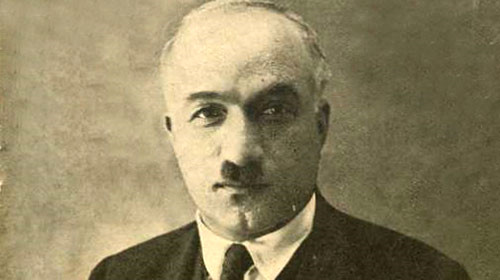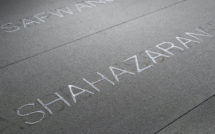

This is part of our special feature on European Art, Culture, and Politics.
In October of 1932, just months before Hitler’s rise to power, the Turkish modernist poet Ahmet Haşim stepped off a train in Frankfurt am Main. Marveling at the architectural wonder of the train station—from its soaring glass domes to its polished marble floors—Haşim describes his first steps in this new city as “an encounter with a Germany at its end.” Indicative of Haşim’s quietly unsettling observational skills, these first impressions of Germany capture the overall tone of his Frankfurt Travelogue (Frankfurt Seyahatnamesi, 1933). Suffering from kidney disease, Haşim traveled to Frankfurt to seek out innovative medical treatment unavailable to him in Turkey. While pleasantly surprised by the comforts he experienced as a patient in Germany and the advanced state of medicine in general, he is constantly confronted with the signs of a cultural-political climate in decline: “Germany is a large pink apple,” Haşim concludes, “but inside it is full of worms.”
Just months before the first book burnings would take place, Haşim accounts the effects of politically conservative changes underfoot in candidly humorous detail: “In order to earn the title of European,” he writes, “a person must certainly have a jacket on his back, slacks, and this or that specific kind of hat on his head. This pathetic and monochrome outfit is the uniform of civilization.” Within the pages of his travelogue, Haşim masterfully utilizes such tongue-in-cheek statements to contradict the concept of a universal and superior European civilization. On the contrary, his travelogue reflects on the eerie homogenity of Frankfurt’s population following the flight of Jews from the city in the face of racial discrimination. The travelogue then concludes with a biting criticism of intellectual conformity via its emphasis on German academics’ failure to critically challenge the rise of National Socialism.
While arguably the most well-known account of Germany in Turkey, Haşim’s travelogue remains largely unknown internationally. First translated into German in 2008, the following excerpts aim to open up this work to an English-speaking audience. As even these short excerpts attest, Haşim’s travelogue resonates strongly with the current political moment, and the rise of right-wing populist movements across the globe. Offering a poetic snapshot of the German-Turkish relationship nearly 88 years ago, it addresses a number of issues that remain pressing today. Most importantly, in its pointed questioning of what it means to be European, Haşim’s travelogue vehemently upholds the power of imagination in the face of technological advancement and the importance of literary-historical documentation amidst the repression of free speech.
Excerpts from the Frankfurt Travelogue (1933), by Ahmet Haşim
A Large European City
Anyone who has ever seen a large European city can presume to have already seen all the large European cities he will encounter thereafter. So much do they resemble one another.
But let us not assume that Frankfurt is unimportant. Once upon a time, crowning ceremonies for German Kaisers were performed here. The famous Heidelberg University is within its spiritual circumference. And in its vicinity lie the trendy thermal springs of Wiesbaden, Bad Homburg, and Bad Nauheim; with their boundless parks, wealthy casinos, fanciful lakes, black and white swans, statues and fountains, they serve as gathering grounds for former Russian princes and English millionaires alike. But above all, just stating the fact that two percent of this city’s inhabitants are Jewish is enough to comprehend Frankfurt’s status as a significant center of commerce. Jews are like large birds: While taking flight to the sky in this direction or that, they indicate the direction in which life will change on the ground. Alone the Jews’ exodus to the North is sign of Frankfurt’s descendance into squalidness from its previously grand prosperity.
On our second morning in this large European city that we entered in the darkness of the night, I didn’t even feel the smallest inkling of astonishment for its buildings, avenues, department stores and crowds. Because this ebb and flow of life in front of me with the name of Frankfurt could just as easily have been Paris, London, Vienna or Budapest.
Without exaggeration, one might contend that European civilization, which is dedicated to the concept of “action,” places more value on external images than on content… In order to earn the title of European, a person must certainly have a jacket on his back, slacks, and this or that specific kind of hat on his head. This pathetic and monochrome outfit is the uniform of civilization.
We might recall what a terrible scandal it was when Mahatma Gandhi, otherwise surrounded by holy cows and copper pots filled with water from the Ganges, rose from his cross-legged position and traveled to London in his white shroud, where the European press mocked his strange garb.
Another type of unpleasantness, which contributes to the uniformity of large European cities, arises from the fact that they no longer contain any secrets, which might excite the imagination. Now even schoolbooks offer children simple explanations for the terrific machines and electric wonders that regulate the life of the city from underground and overhead. Knowing all of this detracts from the wonder, which is otherwise a traveler’s most prized reward.
Looking out at this city of Frankfurt, whose guest I had only been for a total of eight hours, but what seemed more like a hundred years, I thought of the old cities of gold—half visible through the fog—of Carthage, Sidon, Babel, and Nineveh.
Towers with broad steps that must have cost incomprehensible sums, and invisible astrologers, painting their domes with the seven colors of the seven planets… unapproachable granite temples with golden columns, deities lost in thought in their dangerous shadows… and the hair raising, grinning red countenances of those foreign deities…
Admittedly, I would not have found the comfort of Frankfurt’s palaces or the elaborate menus of its restaurants in those cities of antiquity. But what compelling fantasies and sharp shudders those cruel cities of antiquity aroused in foreigners coming from afar!
Streets
I left the hotel after breakfast and wandered randomly through the streets of Frankfurt, which were not yet fully accessible to me.
The condition of this traveler, now walking on foreign sidewalks, was notably strange: His eyes were bulging from their sockets in an effort to comprehend the mysterious objects around him; and his ears, straining to discern the meanings of what they heard, were like two nervous leaves planted on the sides of his head, stupefied despite their best efforts. Victor Hugo’s famous image of a man observing Istanbul through protruding eyes is not merely a caricature, but will forever remain a fitting portrait of the traveler. On the streets of Frankfurt, I felt as if my excessive attentiveness had turned myself into a caricature.
I looked around:
I could never have imagined such wide, geometric, clean and never-ending streets; evidence of both taste and mathematical precision, these streets were such works of perfection that I did not deem it necessary to note down that I had “seen” them.
Stores with large and opulent display windows arranged with striking delicacy show an art of presentation we have yet to learn… Gleaming behind the crystal glass cases, an ordinary fruit, a raw beefsteak, a pocket notebook, a rug, a fountain pen, a bracelet made of turquoise, or a diamond necklace take on a formidable appeal in the pink light of morning. Stern, like the famous soldiers of Friedrich the Great, massive buildings line up to the right and left of these streets; billboards with golden lettering adorn their proud, granite-lined facades… I won’t mention the visual pleasure these buildings gave me here. I’ll just dwell for a moment on the “windows:” those large, felicitous windows of Frankfurt, crystal-clear with white tulle curtains, and red poinsettia flowers with huge green leaves lounging behind them! Whether in the hospital, military barracks, mansions, stores or schools, the windows here have all been adorned with the hand of a German woman, with a secret skill of bliss that could drive the soul mad with the same confidential reveries. Only one who can comprehend and relay the secrets of German windows, can be considered as having performed a service for his homeland.
But what strange activities people engage in on these magnificently decorated streets: Well-dressed and well-groomed gentlemen with complacent faces gather around in different spots singing songs and playing the harmonica. What is to make of this? Is this some public celebration, or a holiday? No, it is neither a celebration or a holiday! These are Germany’s messengers of squalor – they are the unemployed, the beggars, increasing in number by the day.
What do these men want, who cross the paths of passersby with a polite smile, as they hold out tin canisters with yellow and white paper flowers? These are the countless crippled, orphaned, poor, and sick members of society, who are now filling Germany to the brim, and collecting alms on the street.
Who are these men with common faces, all dolled up in the early morning hours with their fake belts, over fake hunters’ uniforms made of yellow fabric, their fake flasks and their fake equipment for an imaginary future voyage? These are the soldiers of “Hitler.” And who are the young men with the red ties, walking around in the dark… They are the communists, who are no more salutary than the followers of Hitler.
Night falls: Lit up by a thousand lanterns, the indigo sky fills the streets. In shadowy corners, the countenance of timid young women wrapped up in black overcoats comes into view. Not one, not two, but more than a thousand! Who are they? Despite the scarcity of clients, they are the German whores, increasing in number from day to day out of hunger.
Germany is a large pink apple, but inside it is full of worms.
Faust’s Ink Spots
Everyone who comes to Frankfurt is asked the following:
“Have you toured the historic city center?”
“Have you been to Rotschild’s house?”
“Have you visited Goethe’s house?”
The city of Frankfurt takes pride in being home to the famous globetrotter Rotschild and the poet Goethe. On the day of my arrival I rushed to Goethe’s house together with my sick friend from Romania.
The day was Sunday. On a quiet, secluded, clean, and shadowy street resembling one in Istanbul, we stopped in front of a door with the knocker of an Istanbul palace and pressed the electric doorbell. However great a poet he may have been, I never expected to find so many visitors in this dark house and shadowy street one hundred years after his death, especially on such a cheerful and sunny Autumn morning, which filled the walls, gardens, and squares with fresh golden flowers. One hundred years after his death, in a country responsible for countless extraordinary scientific discoveries and so dominated by materialism, I did not expect even two people to be visiting the house of Goethe, who was nothing more than an old poet. This was a country that flew a massive Zeppelin in the sky, reducing birds to the ridiculousness of an old machine; that put the Bremen steamer onto the Atlantic with an unheard of speed; and that was home to young Herrdoctors with straw-gold hair, gold-rimmed glasses, and golf pants, who made synthetic fertilizer out of atmospheric nitrogen and sugar out of firewood, who extracted gasoline from coal and prepared for chemical warfare. But I was mistaken. As if descending upon a grave, I entered through the front door; it opened with a cold and shivering motion, and I froze with astonishment. The light of his soul hit us like the first rays of daybreak. The inside of the house was filled with a respectable and significant crowd of schoolchildren, girls, stylish women and men, and older gentlemen. And they were all Germans. Not a bunch of travelers like us drawn here out of curiosity. No swarm of insignificant and indifferent foreigner types.
As one of the two or three rich families of Frankfurt, the Goethe’s house had a well. In those days, having a well was a great privilege for a family. Only the Rotschild’s and the Goethe’s had one. For everyone else, there were public fountains on the street. In the kitchen, we looked at the Goethe family’s magnificent well with reverence. The 50 or 60 cake pans that were arranged on the kitchen walls showed what a loving and ardent housewife Goethe’s mother was. The house had been maintained exactly as it was. The windows were all covered in tulle and flowered curtains, just as they used to be. The house was breathing with memories of the poet. The room in which he passed away one hundred years ago was filled with heaps of wreaths that had been sent from all corners of his homeland. It was as if the body of the poet had still not been removed; the fragrance of fame and honor was fresh and strong like the scent of a huge red rose that had bloomed just this morning.
Finally, we arrived at the poet’s study. The museum guide, who was leading the group through the house, went up to an old desk covered from top to bottom in ink spots. When he said, “Goethe wrote Faust on this table. These stains are the ink spots of Faust!” the crowd’s curiosity and excitement reached its peak, brimming forth from their eyes in the form of light. Nearly forgetting the rules of civilization, everyone crowded around the table in order to get a closer view of those holy shadows. These spots were no normal ink spots in the eyes of their admirers, but skies of blue eternity, an infinite sprinkling of stars.
Published on April 28, 2020.




